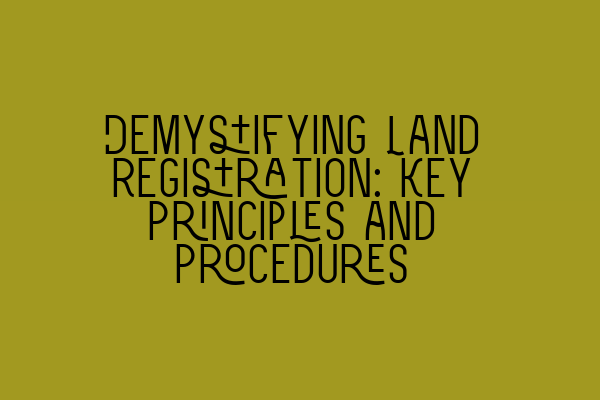Demystifying Land Registration: Key Principles and Procedures
Welcome to the blog of SQE Property Law & Land Law, where we aim to provide you with valuable insights into the world of property law and land registration. In this article, we will demystify the key principles and procedures surrounding land registration, ensuring that you have a clear understanding of this essential aspect of property transactions.
What is Land Registration?
Land registration refers to the process of recording and documenting the legal ownership and interests in land. It provides certainty and protection for property owners, making property transactions more secure and efficient.
Land registration is governed by the Land Registration Act 2002 in England and Wales, which introduced a system of electronic registration known as the Land Register. This central database contains important information about the ownership, rights, and restrictions relating to registered land.
The Key Principles of Land Registration
Let’s explore the key principles of land registration:
- Indefeasibility of Title: Once registered, a person’s title to registered land is generally considered to be ‘indefeasible,’ meaning it is protected against adverse claims, except in limited circumstances.
- Priorities: The Land Register establishes a ‘priority’ system to determine the order of competing interests in registered land. The general rule is that the first registered interest will have priority over subsequent interests.
- Overriding Interests: Certain interests, known as overriding interests, are not recorded on the Land Register but can still affect the registered proprietor. These include interests like rights of way, leases of less than seven years, and certain rights of occupation.
- Notice and Good Faith: A person dealing with registered land is deemed to have ‘notice’ of registered interests and overriding interests. However, a person who acquires a registered interest for value and in good faith will be protected, even if there are undisclosed interests.
- Rectification: Mistakes or errors in the Land Register can be rectified through a court application to ensure accuracy and ensure that the register reflects the true state of affairs.
The Land Registration Process
Now that we have covered the foundational principles, let’s dive into the land registration process:
Step 1: Application for First Registration: When land is first purchased or transferred, an application for first registration is made to the Land Registry. The application includes details about the property, ownership, and any interests or rights that should be registered.
Step 2: Examination and Verification: The Land Registry will examine the application and verify the information provided. This may involve conducting searches, requesting additional documentation, and resolving any discrepancies or issues that arise.
Step 3: Creation of Title: Once the application is approved, the Land Registry will create a unique title number for the registered land. This title number is then used to identify and reference the property in subsequent transactions.
Step 4: Updating and Maintaining the Register: The Land Registry continues to update and maintain the register as ownership and interests change over time. This ensures that the register remains current and reflects the most accurate and up-to-date information.
For a more comprehensive understanding of the land registration process, check out our article on SQE 2 Preparation Courses.
Conclusion
Land registration is a fundamental aspect of property law that provides certainty, protection, and efficiency for property owners. Understanding the key principles and procedures of land registration is crucial for anyone involved in property transactions.
For more resources to help you prepare for your SQE exams, check out our articles on SQE 1 Practice Exam Questions and SQE 1 Practice Mocks FLK1 FLK2. You can also find important information about exam dates on our page about SRA SQE Exam Dates.
Stay tuned for more informative articles from SQE Property Law & Land Law!
